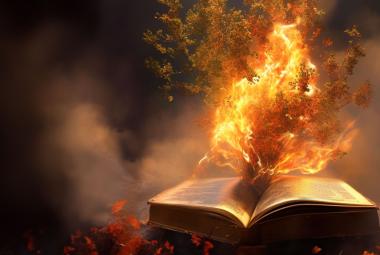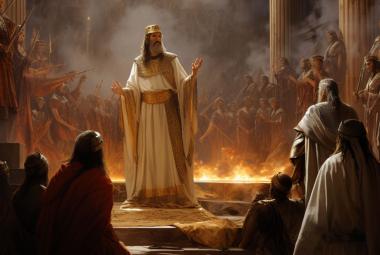I have just returned from the International Prophecy Conference in Florida, where I delivered a disturbing summary of what I believe is our present predicament. It is becoming increasingly apparent that there is serious turbulence on all of our horizons.
The widespread corruption, deceit, and betrayal of those in leadership raise serious fundamental questions: What is happening? What are we to do?
The Wraths of God
We need to realize that there are a number of distinctive “Wraths” of God:
• Appositional Wrath (His Wrath against Sin)
• Catastrophic Wrath (e.g., the Flood of Noah)
• Eschatological Wrath (Revelation 6-19)
• Abandonment Wrath
Abandonment Wrath
There appear to be four instances of God’s “Abandonment Wrath,” which is the focus of this inquiry:
1) Against Samson: Can you imagine Samson’s shock on that final visit to Delilah when he realizes that God had abandoned him (Judges 16:20)?
2) Against the Northern Kingdom: Under Jeroboam II, the Northern Kingdom enjoyed unparalleled prosperity. They felt that it was “the best of times.” However, from God’s point of view, it was the worst of times. Hosea was commissioned to present God’s indictment against the Northern Kingdom (Hosea 4-14).
Ephraim is joined to idols: let him alone.
Hosea 4:17
It was God’s abandonment that led to Assyria’s capture and the removal of the Northern Kingdom from the pages of subsequent history. (We have previously summarized the ostensible parallels to America in our Briefing Pack, Twilight’s Last Gleaming.”
3) Against the Southern Kingdom: it surprised me to realize that there also appear to be highly relevant similar parallels in God’s dealings with the Southern Kingdom as is manifested in the anxieties and lessons in the writings of Habakkuk.
Historical Background
After the destructive debacles of Manasseh, a subsequent good King, Josiah, ushered in a major revival. The reign of Josiah (640-609 B.C.) allowed the people to enjoy a greater degree of prosperity than had been possible in previous years.
After Josiah’s death, however, the people thought the new era of prosperity would last indefinitely. The leaders and the people had ignored the spiritual reasons for their material prosperity. The subsequent realities that faced them were not anticipated by either the political liberals or the religiously minded conservatives of their day.
The apparent parallel with our own predicament in America deserves our attention: In his classic appraisal of the America over a century ago, Alexis de Tocqueville remarked, “America is great because she is good. If America ceases to be good, she will cease to be great.”
We now find that greed and avarice characterize our times; the rich exploit the poor; perversions of all kinds are openly promoted and protected by law; and, we have outlawed God out of our schools and public life. We, too, appear to be plunged into an age of deceit, abuse, and the trampling of the rule of law by an ambitious elite committed to separate us from our foundational heritage. It is in a similar appraisal that Habakkuk wonders: “Lord, why don’t you judge your people?” (He starts out wrestling with God and ends up worshiping Him.)
The burden which Habakkuk the prophet did see. O LORD, how long shall I cry, and thou wilt not hear! even cry out unto thee of violence, and thou wilt not save!
Habakkuk 1:1-2
The word “cry” is actually, shavah, “scream.” [Do you ever feel that way?] The word for “violence” is hamas, an adverbial accusative: violence, cruelty, injustice, oppressor.
Why dost thou shew me iniquity, and cause me to behold grievance? for spoiling and violence are before me: and there are that raise up strife and contention. Therefore the law is slacked, and judgment doth never go forth: for the wicked doth compass about the righteous; therefore wrong judgment proceedeth.
Habakkuk 1:3-4
“I look around this nation and all I see is violence and contention. Why aren’t you doing something about this, Lord?” Habakkuk pleaded. Unrighteous judges; law set at nought; life and property were insecure. The wicked knew how to pervert the judicial process.
Certainly our own predicament is disturbingly parallel. The average capital offender, before he is executed, will spend 22 years in legal procedures at a cost of $1.8 million! The suicide rate among police is four times greater than that of society in general. Out of every 1,000 violent crimes committed in this country, only 2.4 criminals are brought to justice.
Most of our social changes are brought about by court decision, not laws we voted on: bussing, affirmative action, elevation and promotion of sexual perversion, etc.
There are three steps to the downfall of a nation (read Judges; Isaiah, et al.): 1) Spiritual apostasy; 2) Immorality; and, 3) Political anarchy.
The primary problem wasn’t political anarchy. Even immorality was also simply a symptom. It all begins with spiritual apostasy: turning away from the true and living God. Surely we begin to apprehend a painful parallel to our own predicament.
It is in response to Habakkuk’s pleading that we encounter the following remarkable (and often misapplied) verse:
Behold ye among the heathen, and regard, and wonder marvellously: for I will work a work in your days, which ye will not believe, though it be told you.
Habakkuk 1:5
Don’t count God out: Stand back and watch.
However, God’s subsequent announcement leaves Habakkuk more confused than ever—God announces the impending invasion and captivity by Babylon!
For, lo, I raise up the Chaldeans, that bitter and hasty nation, which shall march through the breadth of the land, to possess the dwelling places that are not theirs. They are terrible and dreadful: their judgment and their dignity shall proceed of themselves.
Habakkuk 1:6-7
Habakkuk was probably hoping for a revival or something more constructive! Now he is astonished: these people were more evil than Israel was! And they even add a theological dimension to the events:
…and he shall pass over, and offend, imputing this his power unto his god.
Habakkuk 1:11
(Remember: Allah is antithetical to the God of the Bible!) So now Habakkuk is really struggling; his confusion is intensified:
Thou art of purer eyes than to behold evil, and canst not look on iniquity: wherefore lookest thou upon them that deal treacherously, and holdest thy tongue when the wicked devoureth the man that is more righteous than he?
Habakkuk 1:13
So Habakkuk retreats to his watchtower to await further understanding of this astonishing dilemma:
I will stand upon my watch, and set me upon the tower, and will watch to see what he will say unto me, and what I shall answer when I am reproved.
Habakkuk 2:1
And God assures him a timely (and urgent) answer:
And the LORD answered me, and said, Write the vision, and make it plain upon tables, that he may run that readeth it. For the vision is yet for an appointed time, but at the end it shall speak, and not lie: though it tarry, wait for it; because it will surely come, it will not tarry.
Habakkuk 2:2-3
Be patient. Don’t panic. God has set a bound to all which displeases Him. And this sets the stage for one of the most impacting verses in the entire Bible!
Behold, his soul which is lifted up is not upright in him: but the just shall live by his faith.
Habakkuk 2:4
This key verse contrasts two antithetical groups:
1. Those whose soul is lifted up (by pride, which leads to death:);
2. The just who life by faith.
Whose soul is not upright? Pride leads to death because it will not receive by faith the grace of God (Daniel 4; Proverbs 16:18).
The Just Shall Live By Faith
This was God’s Call to Action for Habakkuk! And it is also our call to action for us today!
Paul’s three epistles—Romans, Galatians, and Hebrews—are a trilogy that amplify Habakkuk 2:4 and are cornerstones of the New Testament. And, they also are our marching orders for the daunting challenges we, too, are—and will continue to be—facing.
• The Just shall live by Faith Who are the just? The Epistle to the Romans was Paul’s definitive answer (cf. Romans 1:17).
• The Just shall live by Faith: How shall they live? The Epistle to the Galatians is Paul’s definitive answer (cf. Galatians 3:11).
• The Just shall live by Faith: How? The Epistle to the He-brews is a call to maturity. (Cf. Hebrews 10:38, which leads to the famed “Hall of Faith” in Hebrews 11!)
The Fourth Abandonment Wrath
4) Against the United States? The fourth application of “God’s Abandonment Wrath” may be already upon us. Habakkuk’s dilemma is certainly identical to our own. It’s time for us to renew our citizenship: we are not optimistic about any answers emerging from our current political leadership: we are monarchists relying on a coming King, like Abraham:
For he looked for a city which hath foundations, whose builder and maker is God.
Hebrews 11:10
For Such a Time as This
We also believe that God has raised up the Koinonia Institute specifically “for such a time as this.” Prayerfully check it out to see if it is responsive to your own quest for direction and preparation. (Go to www.studycenter.com for details.) We would certainly welcome you to join us. The forthcoming harvest for the Kingdom appears to be the most eventful of our lifetime!
See The Prophets to the Southern Kingdom for the verse-by-verse study of Habakkuk, as well as Joel, Micah, and Zephaniah, on page 9.






